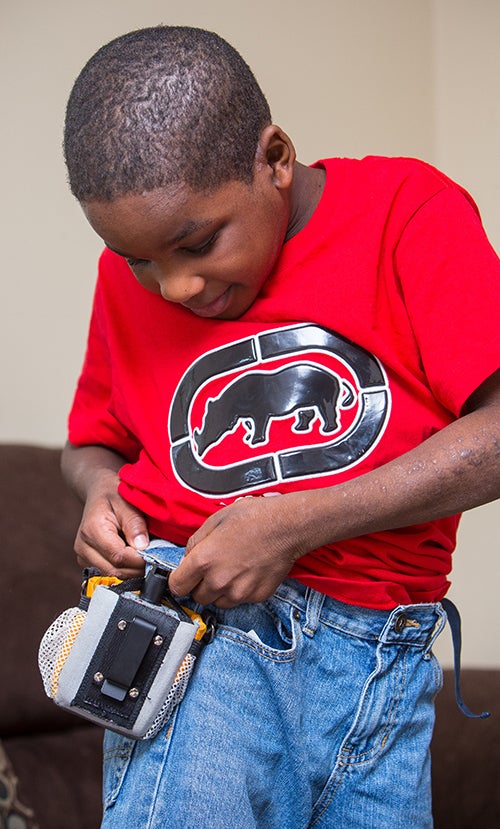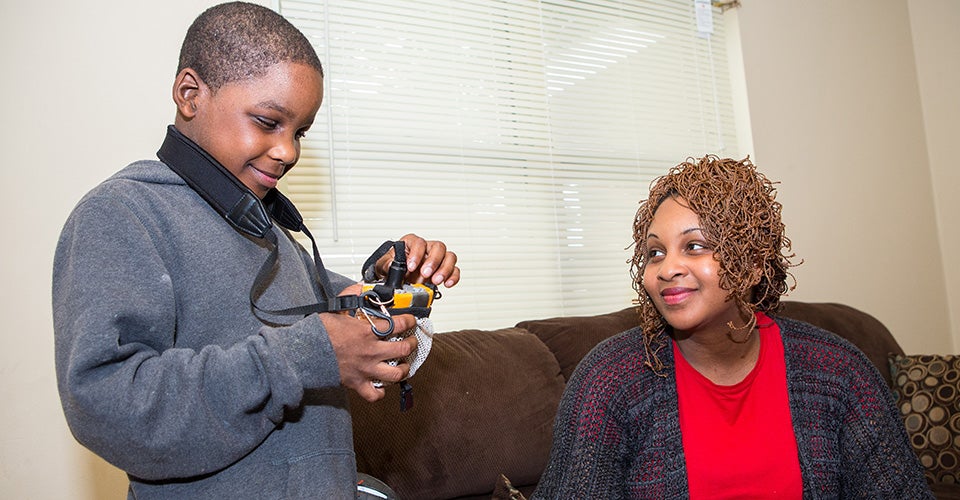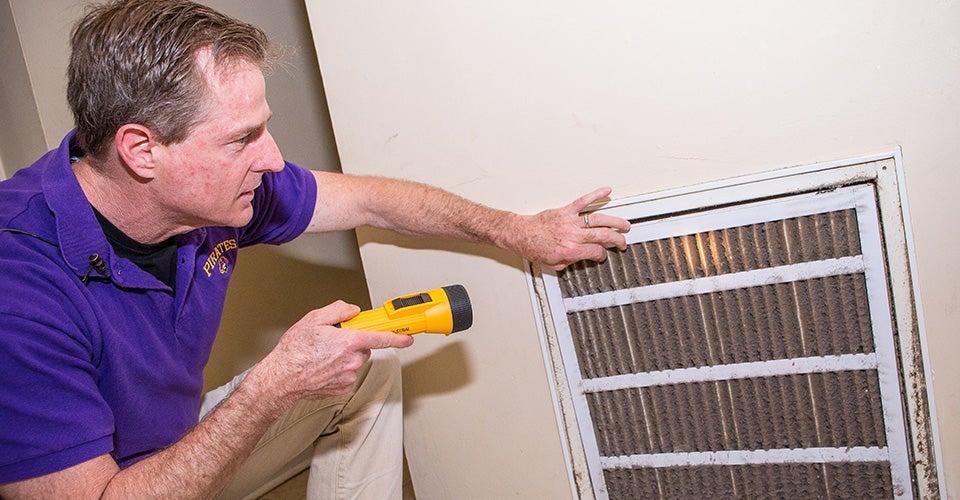BETTER BREATHING
New partnership to address health impacts of devastating storms in the East
A new collaboration between the Brody School of Medicine at East Carolina University, Vidant Health and Legal Aid of North Carolina aims to address the long-term health impacts of devastating storms like Hurricane Matthew on communities in the East.
Funded in part by a $375,000 grant from the Blue Cross and Blue Shield of North Carolina Foundation, this partnership will work to help families whose housing conditions may have residual health effects long after storm waters have receded – especially asthma, the chronic respiratory condition that’s the top reason for school absenteeism in the United States.

Dr. Greg Kearney is an assistant professor in the Brody School of Medicine’s Department of Public Health and recipient of the 2017 Asthma Champion award from the Asthma Alliance of North Carolina.
“For many people with asthma, avoiding environmental ‘triggers’ like exposure to mold inside the home is important to decrease their risk of having an asthma attack,” said Dr. Greg Kearney, assistant professor in Brody’s Department of Public Health, who helped spearhead the grant. Kearney recently received the 2017 Asthma Champion award from the Asthma Alliance of North Carolina for his unique body of practice-based field research around the disease.
“Most people don’t realize that eastern North Carolina has the highest rates of childhood asthma in the state, accompanied by a high percentage of substandard rental housing,” Kearney said. “The combination is a recipe for asthma attacks. As we get into the hot summer months, homes that were impacted by flooding from last October’s Hurricane Matthew and not properly repaired may start to show visible signs of mold inside the home. This could pose a serious threat for people with asthma and allergies – some who have to choose daily between buying a rescue inhaler or buying food.”
Vidant’s Pediatric Asthma Program has been caring for children with asthma through case management and patient and family education for more than 20 years. In 2012, ECU began partnering with them to operate the Eastern Carolina Asthma Prevention Program (ECAPP), a community-based research program aimed at reducing asthma symptoms and emergency department visits among low income children with asthma in eastern North Carolina.
A big challenge for the program has been that renters, particularly those who live in communities with few affordable housing options, have little control over many of the significant contributors to unhealthy housing conditions – mold caused by roof leaks, damp foundations and inadequate ventilation. Many renters are unable to persuade their landlords to make necessary repairs or worry that their requests will lead to retaliatory eviction, which is prohibited in North Carolina.
ECAPP’s new collaboration with Legal Aid’s Medical-Legal Partnership program will give tenants mechanisms to get help from landlords, Kearney said. Medical providers in ECAPP will have a direct resource for patients in need of legal intervention for problems that may have been caused or worsened by Hurricane Matthew.
The Medical-Legal Partnership is a nationally established model built on the recognition that good health depends on many factors that occur outside the walls of clinics and hospitals. It connects low-income patients who are dealing with stressful situations – like unsafe rental housing, wrongful evictions, and improper denial of FEMA (Federal Emergency Management Agency), food assistance, or other safety-net services – to legal resources that can help, using the health care provider as the primary referral source.

Pediatric asthma patient Kameron Hudson adjusts his MicroPEM Sensor.
The program expects to serve families in Vidant’s 29-county service area, with assistance from legal advocates in Legal Aid offices across the eastern part of the state, including those in Greenville, Wilson, Ahoskie and Wilmington. Organizers estimate it could take six to seven years for Matthew-related legal assistance needs to subside.
“Many communities in rural, eastern North Carolina were already burdened, before Hurricane Matthew’s devastating impact, with chronically high rates of extreme poverty and inadequate access to many of the resources that are essential for health and economic opportunity,” said George R. Hausen, Jr., executive director of Legal Aid of North Carolina.
“Disaster recovery efforts require strategic, long-term investments from every part of our state,” Hausen continued. “By working with our collaborators from ECAPP, we hope to be able to remediate the unmet legal needs of many of Vidant Health’s most vulnerable, low-income patients and that our collaboration will result in better health outcomes for patients and communities throughout eastern North Carolina.”
“We know that improving health doesn’t just mean improving access to health care,” said Kathy Higgins, president of the Blue Cross NC Foundation. “Health is built in our homes, in our communities, in our environments. For many of the most vulnerable North Carolinians, Matthew was not the first natural disaster to impact their lives, and it won’t be the last. This partnership focuses on improving the environmental, social and economic devastation caused by storms.”
Kearney said that treating the health conditions of those impacted by storm-related environmental hazards is only part of the solution; addressing the source of the problem is also critical.
“This grant gives us a chance to look more closely into what everybody has been wondering about and assuming: that people are sick because of the mold brought about by Matthew. This helps us examine symptoms in more detail and evaluate the real extent of that damage,” he said.
Kearney said the team hopes to develop a course that will train health care professionals in the basics of pulmonology, spirometry and in-home asthma triggers – taking them into the field to examine environmental factors firsthand.

Pediatric asthma patient Kameron Hudson poses during outdoor recreation with Dr. Greg Kearney and Theresa Blount, Case Manager – Pediatric Asthma Program at Vidant Medical Center.
As the program develops, organizers expect it will expand to focus on other social determinants of health, such as food insecurity, domestic violence and benefits eligibility, many of which are likely to be identified by ECAPP staff who visit families in their homes.
Kearney credits a Brody Brothers “seed grant” that ECAPP was awarded last year with helping to attract the Blue Cross NC Foundation award. Brody Brothers grants are a recurring, private funding source for research at East Carolina related to diseases that most impact eastern North Carolinians.
Kearney, working with Theresa Blount of Vidant’s Pediatric Asthma Program, used the Brody Brothers grant to collect air samples from the rural environments of ECAPP participants which could then be examined for asthma triggers like pesticides and mold. He said the grant enabled them to look at what biomarkers were contributing to the children’s asthma, which in turn helped them provide better patient education as well as environmental supplies to reduce asthma triggers.

Jennifer Goss watches as her son Kameron Hudson checks his MicroPEM Sensor for air pollution levels.
